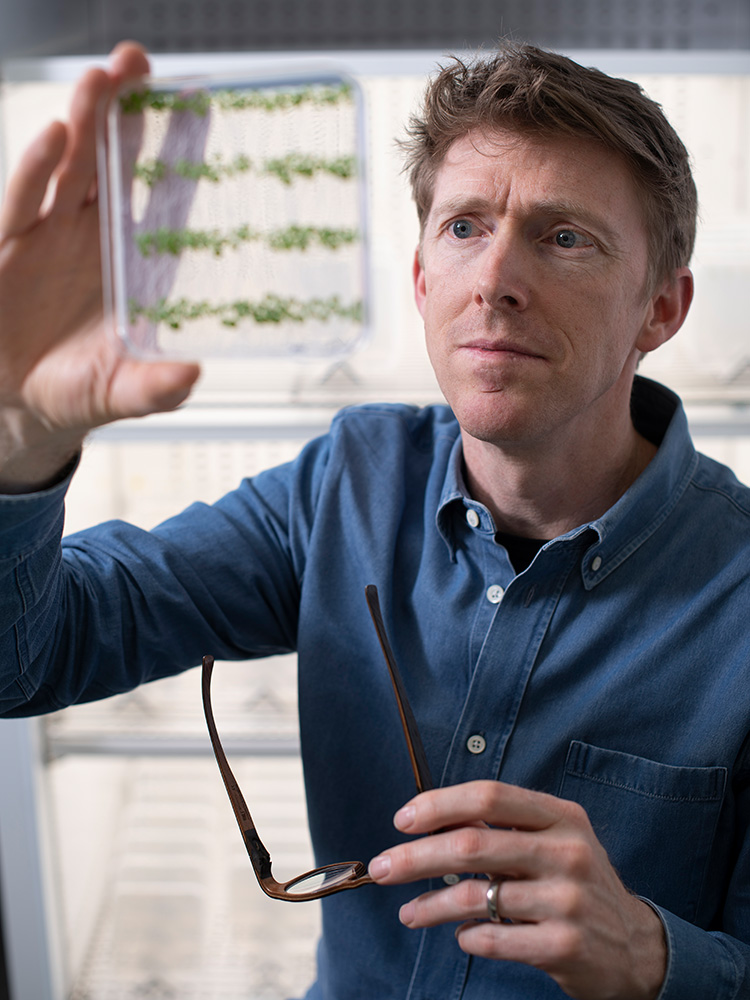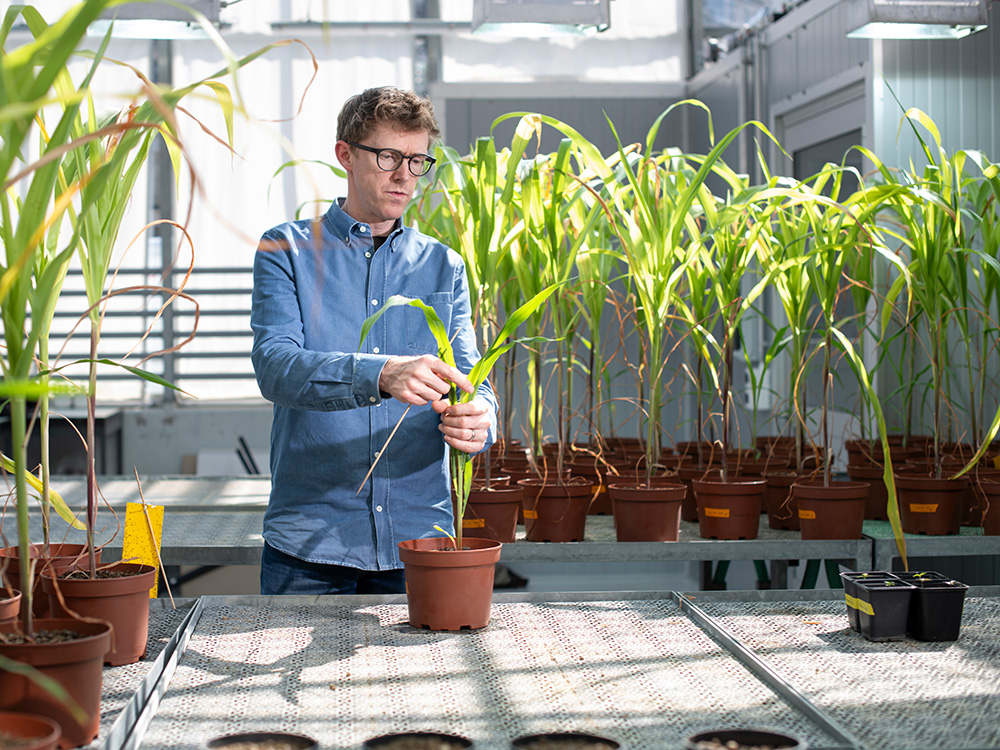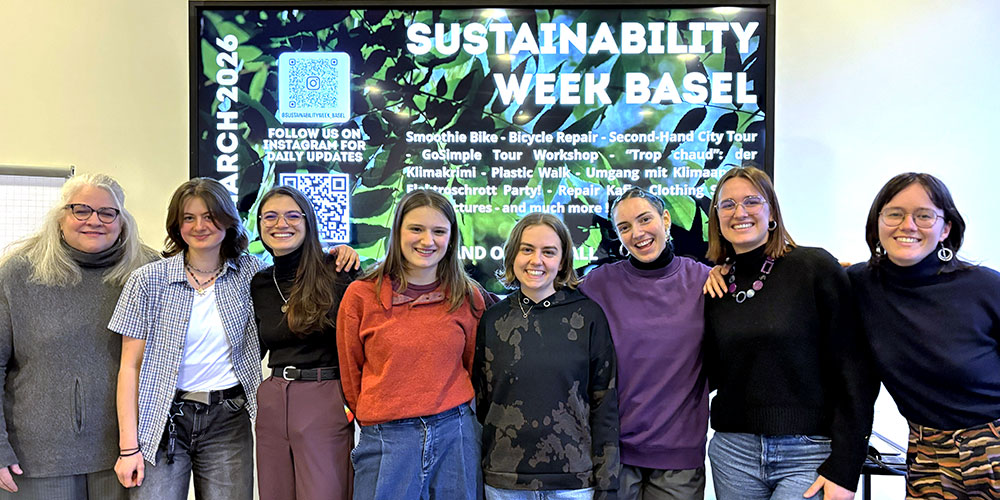How Plants communicate with the Soil Microbiome
Bacteria and fungi in the soil have a major influence on plant growth. Plant researcher Klaus Schläppi is working to understand the biological mechanisms behind this interaction − knowledge that could help make agriculture more sustainable.
Corn first, then wheat? Which crop grows best where? Farmers often know from experience, which varieties and crop rotations work best in their soil. Step by step, research is uncovering the processes behind these empirical values. These insights could pave the way for farming with less on fertilizers and pesticides.
At the heart of this scientific detective story is Klaus Schläppi, Professor of Plant Sciences at the University of Basel. His research focuses on the interaction between plant roots and soil microbes, which play a key role in plant growth. Over the course of his career, Schläppi has witnessed − and achieved − major breakthroughs in this field. Some of his scientific publications are among the most cited on the topic. «Somehow, I was always in the right place at the right time,» he says.
During his studies and PhD at the University of Fribourg, Schläppi investigated defensive compounds secreted by plant roots. At the Max Planck Institute for Plant Breeding Research in Germany, he then developed methods for genetically identifying different types of soil microbes. Using microbiome analyses, he was able to prove for the first time that plants can alter soil microbial communities by releasing such defensive compounds. As a group leader at the Swiss Center for agricultural research Agroscope and at the University of Bern, agriculture became a more prominent part of his work − along with a key discovery: the composition of the soil microbiome has a significant impact on the growth of future generations of crops.
Not all Soil Microbiomes are the same
In 2020, Klaus Schläppi accepted a position at the University of Basel, where he now leads a research group of around 20 people at the Department of Environmental Sciences. «Everything we do is teamwork, and I'm just one part of it», he emphasizes. One of the key questions his team investigates is how plants communicate with different soil microbiomes.
To alter the composition of the soil microbiome, the team uses a trick: they cultivate different maize lines that vary in the defensive compounds they release through their roots. The soil microbiome of wild-type maize and maize lines that do not produce a specific defensive compound differ significantly in their microbial composition. In a second step, the team examines the effects of these different microbiomes − for example, on the growth of wheat.
Such field trials have shown that the beneficial soil microbiome of wild-type maize can lead to up to eight percent higher wheat yields. «That makes a real difference in practice. Our research is therefore highly relevant for agriculture,» says Schläppi. Depending on the soil microbiome, plants can also become more resistant to disease. Choosing the right crop varieties in rotation can thus influence how well the following crop performs − and how much fertilizer and pesticide is needed. For these field studies, Schläppi collaborates with the agricultural research institute Agroscope in Changins. He also maintains a wide network of national and international research partnerships.
Plants «sense» the Microbiom
To understand how the root microbiome interacts with plant defense compounds, Schläppi and his team are investigating how the microbiome communicates with the plant − for example, how root bacteria adapt to specific host plants and break down their defense substances. This fundamental research paves the way for the targeted development of microbial products that can improve nutrient supply or plant protection. The work is supported by an ERC grant funded by the SERI with two million CHF.
In a more recent research project, Schläppi’s team is working to characterize fungal communities in deep soil layers in forests, aiming to identify their distribution patterns and responses to drought and tree health. To do this, the researchers will analyze soil cores up to one meter deep from beech forests in Switzerland, examining both fungi and tree roots. Because of their symbiosis with trees, these fungi play a vital role in the trees’ uptake of nutrients and water − a process increasingly under threat due to climate change, with serious implications for forest health. The Swiss National Science Foundation is funding this project with over half a million CHF.
In a just completed project, also funded by the Swiss National Science Foundation, Schläppi explored how exactly plants respond to beneficial bacteria and fungi. It became clear early on that not every plant variety is able to recognize beneficial soil microbiomes. «Since plants react differently to microbes, they must somehow be able to perceive them», he explains.
The plant immune system appears to play an important role, as shown by a series of experiments with Thale cress. This plant is used in research as a model organism, and there are hundreds of well-characterized, genetically distinct lines available. The researchers identified a receptor that detects a signal from the microbiome in the root cells, boosts the immune response, and thereby promotes better growth. «For the first time, we were able to show that genetic factors control the response to the microbiome», says Schläppi. This illustrates how crucial it is in agriculture to choose the right genetic variations − in other words, the right crop varieties.
«The whole world is trying to understand how the genetics of a host plant can influence the microbiome», says Schläppi. For example, microbial communities also play an important role in human health. The gut microbiome, for instance, differs from person to person. But such phenomena can be studied more easily and on a larger scale in plants. «That’s why I expect that plant research will achieve a breakthrough in this area first», predicts Schläppi.
Further Links
- Department of Environmental Sciences, University of Basel
- mifeePs: decoding microbiota feedbacks on plants
- Deep soil ectomycorrhizal communities of beech forests
- Plant Responsiveness to Microbiota Feedbacks
- Max Planck Institute for Plant Breeding Research
- Agroscope − Field-Crop Systems and Plant Nutrition
- Klaus Schläppi in the Uni News




